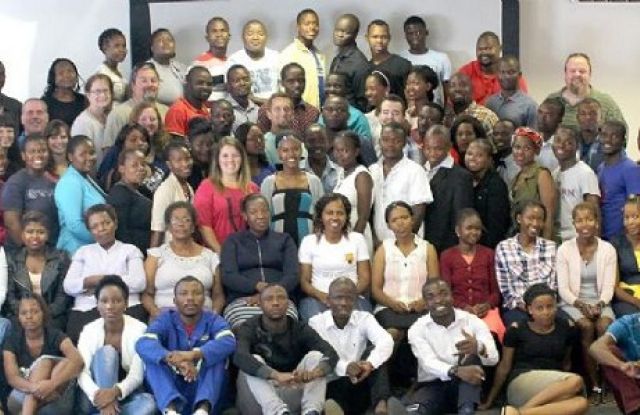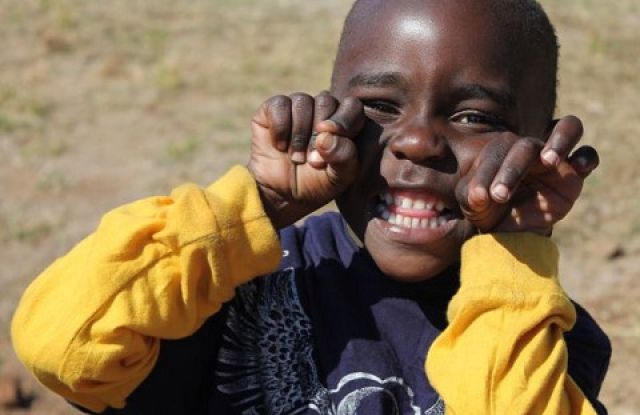 Swaziland is home to 130,000 orphans, a number that, incredibly, is growing approximately 10% a year. AIDS is killing the adults, leaving behind the children. The average age of death is 30.
Swaziland is home to 130,000 orphans, a number that, incredibly, is growing approximately 10% a year. AIDS is killing the adults, leaving behind the children. The average age of death is 30.
Swaziland stresses cultural tradition continually. Culture allows for multiple marital partners and several children. Tradition dictates that children are cared for by the community. If a parent dies then the extended family is supposed to take them in. The problem now is that, in many cases, all the extended family members are dead.
The traditional caregiver in a family is called a “go-go” or a grandmother. It is not uncommon for a go-go to be responsible for feeding over 30 vulnerable children with no access to funds or food.
70% of the land in Swaziland is owned by the King. Land is parceled out to over 300 chiefs to care for and divide among the people. Chiefs are the traditional rulers in a these divided communities.
The rural areas are still very traditional. Many Swazi people still live on homesteads and these are passed down through the family. Even Swazi people who live in the towns or cities often still have ties to a homestead which they may visit on the holidays or weekends. Swaziland is called a “Christian” country in its own constitution, but the real religion that dominates is ancestral worship. The spirit of the dead is revered above the spirit of Christ.
If parents die, the community wants the children to remain on the land to honor the dead parents. This does not mean that the children will be protected or provided for. In a sense you have an invisible orphan population. They have a roof over their head, but no source of provision. This forces many children into prostitution as a way to earn school fees (there are no free schools in Swaziland and the average school costs nearly $500 a year), food, and pocket money.
The situation worsens on a daily basis. Drought, poor water supply, lack of electricity, high unemployment and so many more factors compound the problem. The average Swazi income is $21 a month.
Will the church sit by and watch, or will we heed a call to action? A good place to start is by helping go-gos provide for the children in their care by buying the handicrafts some of them make. Here’s a simple way to begin helping – buy a purse for $18 and the profits will enable a go-go to feed an orphan in her care for a month. Or, if you’re in the Atlanta area, join us tomorrow (Sunday) night for a party benefiting the orphans. More info here. 
Swaziland is home to 130,000 orphans, a number that, incredibly, is growing approximately 10% a year. AIDS is killing the adults, leaving behind the children. The average age of death is 30.



Just found this article and i was interested to read but the follwing details are not accurate. This does not really apply to the whole of Swaziland – thats a bad interpretation of the problems of hunger , drought, and poor water supply.
swaziland is in four regions the above problems are faced in the east of the country and the HIV is the whole country.
and i dont think that having electricity makes ones life better or worse- but it really makes it easy because you then get all the pleasures that go with it.
Its a want not a need.
The $21 as a average salary is a bit unrealistic – againg there are so many catergories its a broad area to talk about
. There is a basic salary but not this much – Its always important to do the research before.
quote from the article below
The situation worsens on a daily basis. Drought, poor water supply, lack of electricity, high unemployment and so many more factors compound the problem. The average Swazi income is $21 a month.
The traditional caregiver in a family is called a “go-go” or a grandmother. In a sense she is the orphan director, trying to cope with a continually growing number of orphans. It is not uncommon for a go-go to be responsible for over 30 children with no access to funds or food.
The above is very much senseless – there is no granny that is looking after 30 kids in this country and if she does its her choice and because she is getting funding from some where. but a normal granny does not have so many grand kids – its ok to exaggerate but not to this extent. where would she get this kids from.
I would like to meet the granny if there is one and i will offer any kind of help i can possible have provided they all belong to her biological children.
In most case the truth is the best and people will give money with a clean heart if they see the truth and you dont have to be on a while chair for people to help you.- Meaning that people will always help with out painting such a bad picture about other people.
Myxo,
My info comes from our workers on the ground. We care for nearly 3000 orphans at approx. 30 carepoints. The gogos indeed are the primary caregivers and do look after large number of children. The number 30 correlates to the number of gogos at our carepoints and the number of children looking for food and water there. Yes, there may be other caregivers, but they don’t help much.
I’m not sure whether to take you seriously or not. The comment “i dont think that having electricity makes ones life better or worse” is patently absurd.
Talk to Pastor Gift who runs our Nsoko base and has been without electricity or the water that an electric pump brings for the better part of a year.
Or talk to him about “the problems being in the east of the country” – he is in the southwest.
please talk to my people at the AIM office in Manzini to get a correct view of the crisis.
as someone who has live allmost all her life in rural areas i’ve seen how poor SWAZI people are. as a results of the HIV pendemic in swaziland we are living with some of the reltives. beside there are other children in our community which we support in terms of food becouse they are living with their grandparents which are poor them selves and cant support them. we usual farme a large plece so we caNN PROVIDE FOR US AND THE OTHER PEOPLE
The above is indeed correct. I was a missionary kid in Swaziland for many years and our denomination has some of the same care giving issues for many orphans and adults effected by aids. MYXO is either playing dumb or delusional and I would challenge him to take himself to Swaziland and go experience it himself if he really wants to get a clear picture of the situation. It is absolutely horrible and I am ashamed to say the US does not talk much about this issue in America. The reports that are being given “officially” are horribly erring on the side of positive. Seth i appreciate your article so much. Swaziland and all of you who are making s difference are in our prayers.
Brian
Thank you for your response on the above comment but i would like to ask your nationality, where you are from.?
I am Myxo a Swazi living here both in town and the Village. And you are saying you have been a Missionary KID for many years and i forgive you for all your atittude an all your statements. You can take me seriosly or not it makes not defference to me.
The west comes here with their ideas and dividing the communities and this is happening again hundred year later. Any i know there are many poor people in this country but you can not find a granny looking after 30 kids(if there is one please take me to here when you come to Swazi next time.)Also can you imagine how disrespecful it is to call a granny an orphan director.And i do agree there are poor people in my country that need help and you should help them with out making it sounds dramatic like you have done. Where in the world do you come from yourself and you mean there is no poverty where you from?
Even in the US there are people who have nothing to eat and they have no work , eating from bins and gutters please clean up your back yardfirst before you come and critise us in Africa. Its unfortunate that we as Africans cant affaord to travel to Euorpe and the North America And the US to see the crazy shit that happens there. As i said you can take me seriously and or notits up to you.
But anyway you would not like to be challenged on this subject since you think everything you say is right.
Look im not happpy about the situation in Swaziland but the but i dont think its right either to publise wrong facts.